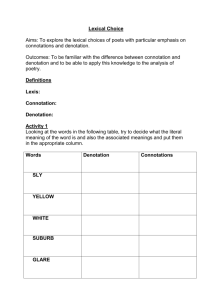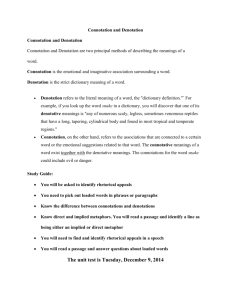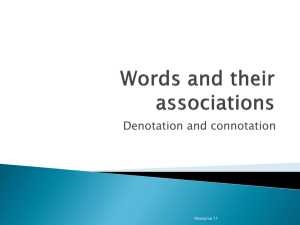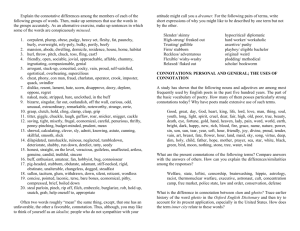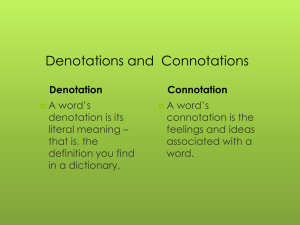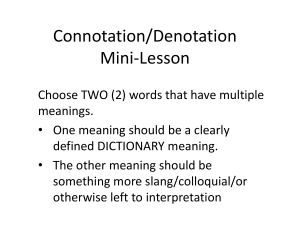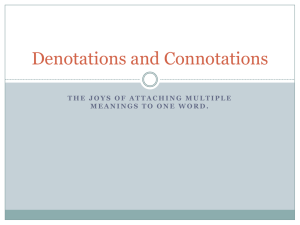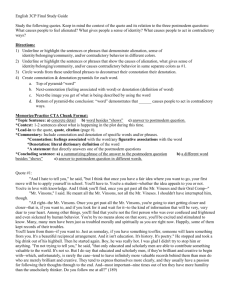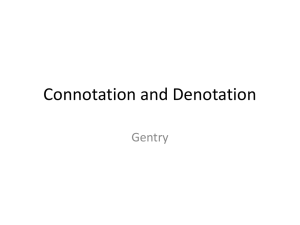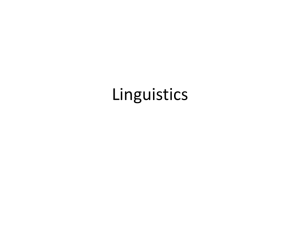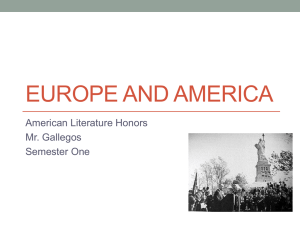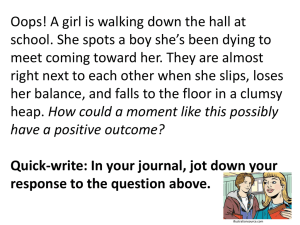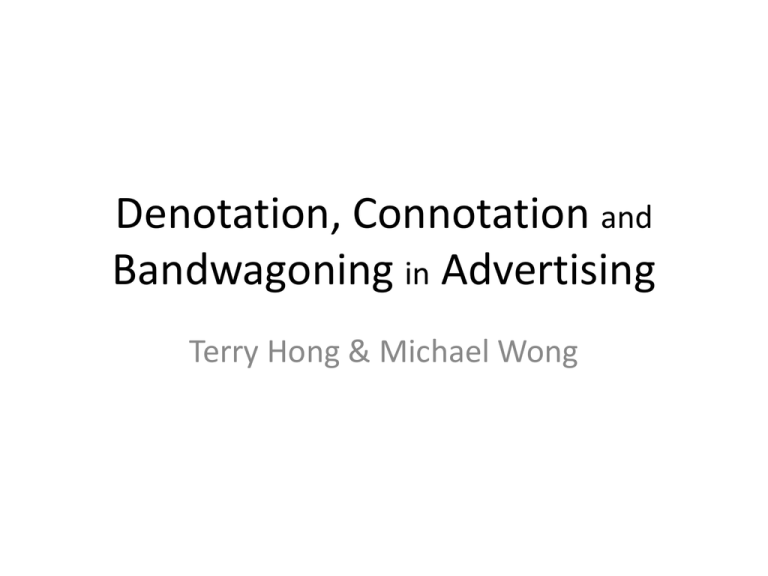
Denotation, Connotation and
Bandwagoning in Advertising
Terry Hong & Michael Wong
Describe or draw attention to (a product, service, or event) in a public
medium in order to promote sales or attendance
ADVERTISING
Advertising is designed to:
1. Establish Product Superiority
2. Create a distinctive image for the product
Ultimately to persuade the consumer to
purchase the product.
DENOTATION
What is it?
• “Literal, explicit meaning”
• “Factual”
• “Dictionary Definition”
• Denotation of a word/image conveys
information
Types of Denotation (Images)
According to philosopher C.S. Peirce (1839-1914):
- Icon: Direct representation (e.g. Image of the car
in car ad)
- Index: representation by association (e.g. Group
of friends laughing in disposable camera ad)
- Symbol: representation by convention, (e.g.
“Golden Arches” logo of McDonald’s) –
Advertisers want their symbol to become indexical
Use in advertisements, consider:
Portraying/presenting the ad to the audience
- How is the denotation of the images in the ad
helping to achieve the aims of the advertisers?
- What is the image of? Multiple? Pack shot?
- What type of representation?
- Camera angle?
- Image type/effects?
- Non-verbal messages? (Body language of the
model?)
Camera Effect:
Sepia-Tone, Icon
representation of band
members but as babies
(possible messages and
connotations)
Also Font:
Antique cursive fonts –
attracts attention but not
so much so to detract from
image
Sepia and cursive perhaps
normal for the time, or
perhaps suggesting
nostalgia
Camera Angle:
Here the audience is put
into a low viewpoint,
looking up at the ad.
Authority and Power given
to Batman over audience.
Text:
“The Dark Knight”, could
denote colour or the
nature. Juxtaposition of
dark and knight (traditional
connotations). Slight wordplay conveying info about
the movie themes
Colour:
Black and Orange/Red
Nighttime, contrast, helps
it stand out
CONNOTATION
What is it?
• “Figurative, implicit meaning”
• “Emotional & Imaginative Associations”
• “Additional suggestive meanings”
• Connotations of a word/image create
connections
• May depend on personal & cultural context,
social mindsets of the time
Use in Advertisements:
- Transferring/Creating connotations for the
product
- Diverting/replacing connotations
- “Short-circuiting” unwanted connotations
Advertisers want to make their product evoke
desirable connotations. A product may become
associated with a life-style or a quality.
Denotation: Jessica Alba using this skin make-up
Also consider, angle? Looking side-on, seductive? Index
Connotation: J. A. associated with beauty, glamour
and sex appeal, transfers connotations to product
Denotation:
Image of a waterfall next to
pack shot of KOOL cigarettes
(recognition)
Trying to make the waterfall
image indexical
Connotation:
Cigarettes -> hot, dry,
cancer, disease
Waterfalls + Green ->
Natural, Clean, Refreshing
“short circuit” – Cigarettes
instead become associated
with nature and cleanness
Linking Denotation and Connotation
e.g.: Cosmetics ad featuring a female model
Denotation:
Signifier – Image of female model
Signified – Female model
Connotation:
Signifier – the signification of the female model
Signified – Beauty, glamour, sex appeal
Denotation and Connotation
Exist Together
Denotation:
Connotation:
Hollywood – A location in
LA, center of American
film-making
- Glitz, Glamour,
Celebrity, Dreams of
Stardom
Cigarette – Rolled up dry
tobacco leaves
- Death, Cancer, Dry, Sick,
Illness
Same Denotation, Different
Connotations
• Home
– Both denote: “Dwelling
Place”
• House
But Real Estate Ads like to
use “Home” instead of
“House”
Because “Home” carries
connotations of family,
security, warmth, comfort
& love
BANDWAGONING
What is “bandwagoning”?
•
•
•
•
A wagon used for carrying a band?
Political jargon?
Is it positive or negative?
Examples
The Bandwagon Effect
• It is when people tend to do what others do, without
considering what their actions entail.
• This effect becomes more pronounced as more
people adopt the same idea (also known as
groupthink).
• For example, PSY’s Gangnam Style was affected;
people danced to it because lots of others did as
well.
Bandwagoning in Advertising
• Advertisers often “jump on a bandwagon” to appeal
to social values, improving the product’s image.
• These social values are often emerging or resurgent,
because most people like being unique.
• Statistics and superlatives are usually used to jump
on a bandwagon.
Example 1: Toothpaste
• #1 toothpaste brand
• Recommended by doctors
• Use of superlatives such as
“only”
• Weasel words are used to
impress without facing legal
problems
• “Triclosan” is a widely used
and controversial substance
Example 2: Guitar Hero
• This advertisement appeals
to the fans of the thenemerging musical video
game genre
• As it piggybacks on the
massively successful Guitar
Hero franchise, it has a huge
audience and causes
groupthink.
Analysis Activity

